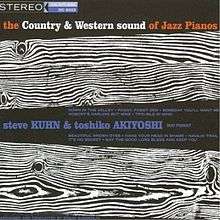The Country and Western Sound of Jazz Pianos
The Country and Western Sound of Jazz Pianos is an album recorded by jazz pianists Toshiko Akiyoshi and Steve Kuhn in New York City in 1963 and released on the Dauntless label. It was later re-released on the Chiaroscuro label under the title, Together, Steve Kuhn and Toshiko Akiyoshi.
| The Country and Western Sound of Jazz Pianos | ||||
|---|---|---|---|---|
 | ||||
| Studio album by | ||||
| Released | 1963 | |||
| Recorded | Olmsted Studios, New York City, 1963 | |||
| Genre | Jazz | |||
| Length | 40:22 | |||
| Label | Dauntless DM-4308 / DS-6308 | |||
| Toshiko Akiyoshi chronology | ||||
| ||||
| Steve Kuhn chronology | ||||
| ||||
| Alternative cover / title | ||||
 Chiaroscuro release CR 2026 | ||||
| Review scores | |
|---|---|
| Source | Rating |
| Allmusic link | |
Track listing
LP Side A
- "Trouble in Mind" (R. Jones) – 4:42
- "Hang Your Head in Shame" (E. G. Nelson, S. Nelson, F. Rose) – 3:54
- "May the Good Lord Bless and Keep You" (M. Willson) – 3:20
- "Someday You'll Want Me to Want You" (J. Hodges) – 4:20
- "Down in the Valley" (traditional) – 3:40
LP Side B
- "Beautiful Brown Eyes" (G. Walters) – 4:22
- "It's No Secret (What God Can Do)" (S. Hamblen) – 4:47
- "Nobody's Darling But Mine" (J. Davis) – 3:23
- "Along the Navajo Trail" (D. Charles, E. DeLange, L. Markes) – 3:24
- "The Foggy Dew" (traditional) – 4:30
Personnel
Arranged & conducted by Ed Summerlin [2][3]
- Toshiko Akiyoshi – piano, celeste
- Steve Kuhn – piano, harpsichord
- David Izenzon – bass
- John Neves – bass
- Barry Galbraith – guitar
- Pete LaRoca – drums
gollark: They actually officially released it and made documentation now.
gollark: It's what I was showing outputs from last week.
gollark: They really are bad at noticing OH BEE THE FAN NOISE.
gollark: Oh, we replaced trout with apioforms centuries ago.
gollark: What? That's stupid.
References
- Dryden, Ken. "Steve Kuhn & Toshiko Akiyoshi: Country and Western Sound of Jazz Pianos". Allmusic. Retrieved 2013.
- Feather, Leonard (1966). The Encyclopedia of Jazz in the Sixties. New York: Bonanza Books. p. 269.
- "The Country and Western Sound of Jazz Pianos". High Fidelity. Volume 13, Part 1. p. 78. Retrieved 2013-03-25.
This article is issued from Wikipedia. The text is licensed under Creative Commons - Attribution - Sharealike. Additional terms may apply for the media files.